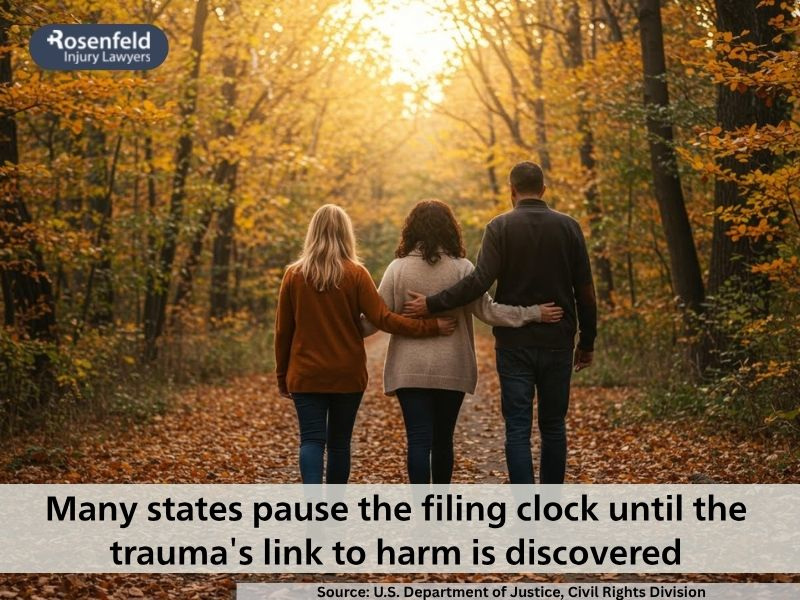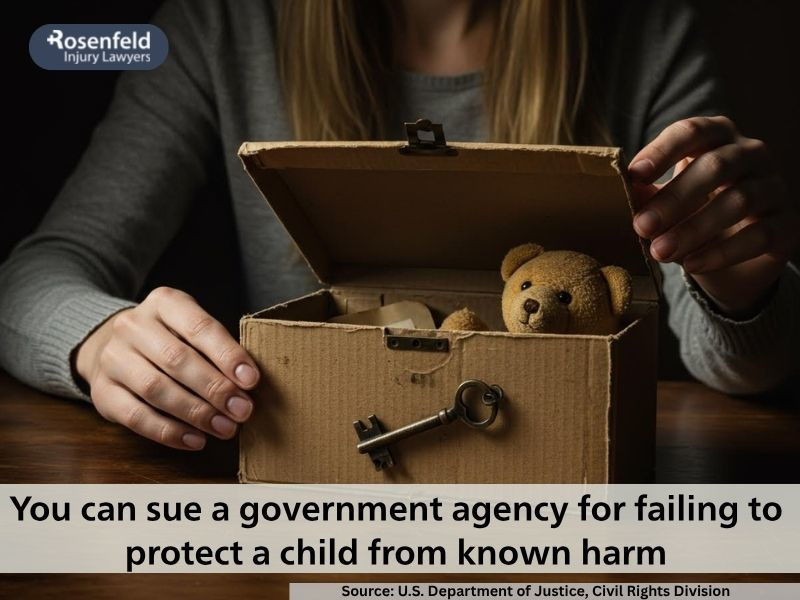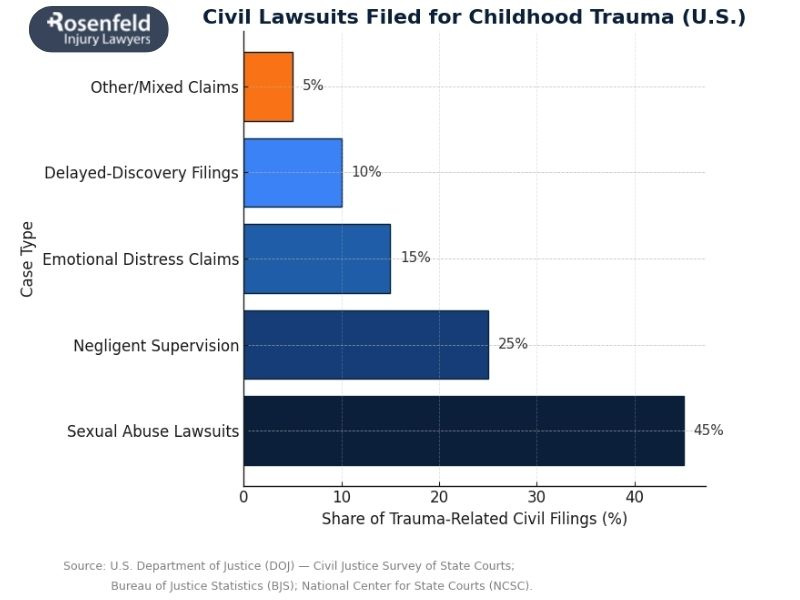Can You Sue for Childhood Trauma?
Many survivors quietly ask themselves: Can you sue for childhood trauma? Often, this reflection comes after years or even decades of carrying the weight of painful memories.
While the emotional wounds of abuse may never fully fade, taking legal action can be a powerful form of validation and accountability. For many, it’s not just about compensation, but also about being heard, acknowledged, and reclaiming control over a story that was once taken from them.
We know that survivors often struggle with uncertainty, such as wondering whether what they went through “counts,” or whether it’s too late to act. Our role isn’t to pressure anyone into pursuing a lawsuit, but to help you understand your rights and options with compassion and honesty.
You deserve to know that justice is possible, and that you’re not alone in exploring what that path might look like.

What Types of Childhood Abuse Can Be Grounds for a Civil Lawsuit?
Many forms of childhood trauma can cause lifelong emotional, psychological, and even physical harm, injuries that may form the basis of a personal injury or institutional liability claim. Survivors often suffer in silence for years before realizing that what happened to them wasn’t just wrong, it was an actionable violation of their rights.
Modern research shows that abuse affects brain structure and development, altering how survivors process emotion, trust, and fear well into adulthood. Recognizing this connection is a key part of understanding why the law allows victims to seek justice, even long after the abuse occurred.
Civil action arising from child sexual abuse cases is not limited to one setting or type of perpetrator. Our firm has represented survivors in claims against a wide range of institutions, including:
- Public and private schools, where staff or administrators ignored clear warning signs.
- Clergy and religious organizations, where positions of trust were exploited.
- Medical professionals, who abused authority in clinical or therapeutic settings.
- Foster care agencies and group homes, where oversight failures led to preventable harm.
- Youth sports programs, where coaches or volunteers violated safety rules or engaged in misconduct.
Below are some of the most common types of abuse that may give rise to civil litigation:
Physical Abuse
Physical abuse can include any intentional use of force that causes harm to a child, from beatings and restraints to excessive discipline. Beyond visible injuries, many survivors experience chronic anxiety, fear responses, and lifelong health issues.
Civil litigation allows survivors to hold both abusers and negligent institutions accountable for the harm inflicted.
Emotional Abuse
Emotional or psychological abuse often leaves no physical scars, but its impact can be equally severe. Constant belittling, humiliation, or manipulation can erode a child’s self-worth and stability, often leading to depression, PTSD, or difficulties forming relationships later in life.
These harms are legally recognized, and survivors may pursue claims when teachers, caregivers, or staff inflicted or ignored such conduct.
Childhood Sexual Abuse
Among the most devastating forms of trauma, childhood sexual abuse can alter every aspect of a survivor’s life. The effects of sexual abuse during childhood often include long-term anxiety, dissociation, self-blame, and trust issues. In many cases, institutions such as schools, churches, or youth groups turned a blind eye to known predators, allowing abuse to continue unchecked.
Civil suits in these cases aim to force institutions to change and ensure other children are protected.
Neglect
Neglect occurs when a caregiver or institution fails to meet a child’s basic needs, including food, safety, supervision, or medical care. Chronic neglect can disrupt emotional development and education, sometimes resulting in lifelong instability and health problems.
When systemic neglect occurs in foster homes, residential programs, or treatment facilities, litigation helps expose patterns of failure and create accountability where oversight broke down.
At our firm, we believe every survivor’s experience matters, regardless of the form of abuse or how long ago it happened. We investigate each claim with sensitivity and persistence, focusing not just on what occurred but on the impact the trauma has had on the survivor’s life.

Who Can Be Held Liable in Child Abuse Cases?
In many child abuse cases, the person who caused the harm isn’t the only one responsible. Civil lawsuits are not just about suing individual abusers; they can also hold institutions and organizations accountable for allowing the abuse to happen or for failing to protect the children in their care. They can also be filed completely separately from the related criminal cases.
When those in positions of authority ignore warning signs or prioritize their reputation over a child’s safety, the law provides a path for survivors to seek justice.
Institutions that may be held liable include:
- Public and private schools that failed to investigate complaints or properly supervise staff.
- Churches and youth ministries that transferred or protected clergy members accused of misconduct.
- Foster care systems that placed children in unsafe environments or failed to respond to reports of mistreatment.
- Residential treatment centers where inadequate oversight led to physical or emotional abuse.
- Youth sports programs that ignored or concealed misconduct by coaches or volunteers.
- Daycare facilities that neglected proper screening, training, or supervision of caregivers.
At our firm, we look beyond the individual act of abuse to uncover the systemic failures that made it possible. We investigate who knew, who failed to act, and whether internal documents or prior reports show a pattern of neglect or cover-up.
Our firm works to hold both institutions and individuals accountable, ensuring that survivors are not dismissed or silenced and that meaningful change follows.
What Types of Financial Compensation Can Childhood Trauma Victims Recover?
When we represent survivors of childhood trauma, we know that no amount of money can undo what happened. But pursuing litigation can help survivors rebuild their lives by covering the real and lasting costs of abuse, from medical treatment to emotional recovery. Our clients often seek more than financial support, but also validation, healing, and accountability.
Victims of child abuse and childhood sexual abuse may be entitled to recover damages for:
- Medical expenses and therapy costs (past and future): Ongoing therapy, trauma counseling, psychiatric care, and medical treatment related to the abuse.
- Emotional distress and pain and suffering: Compensation for anxiety, depression, PTSD, and the ongoing emotional pain that stems from childhood trauma.
- Lost earning capacity: When trauma disrupted education, career paths, or long-term earning potential.
- Loss of enjoyment of life: For the ways trauma affects relationships, confidence, and the ability to live fully and freely.
- Punitive damages: Awarded in cases involving gross negligence, institutional cover-ups, or systemic indifference, to punish wrongful conduct and deter future harm.
Each legal claim we take on is guided by the survivor’s personal goals, whether that means gaining closure, making institutions take responsibility, or ensuring that other children never suffer the same harm.
Our role is to stand beside survivors through the civil process, helping them pursue justice in a way that supports their long-term well-being and honors their strength.
How Long Do Victims Have to File Personal Injury Claims?
One of the most common questions we hear from survivors is how much time they have to take legal action. In child sexual abuse cases, these time limits are governed by what’s known as the statute of limitations, a law that sets the deadline for filing a lawsuit.
Because many survivors are unable to process or disclose their trauma until years later, many states have adopted discovery rules that pause or extend the statute of limitations.
These rules recognize that the harm from childhood trauma often isn’t fully understood until adulthood, when the survivor begins to connect the emotional and psychological impact of the abuse to what happened years earlier.
In some states, lawmakers have gone even further by eliminating time limits altogether for certain childhood sexual abuse or child abuse cases. This shift reflects growing awareness that trauma stems from deeply personal, long-buried experiences that take time to surface.
Because these laws vary widely by state, our knowledgeable attorneys carefully review each survivor’s timeline to determine how the statute of limitations and discovery rules apply.
Even if decades have passed, you may still have the legal right to file a lawsuit. We can help you understand how the law protects your right to be heard and guide you through every step of the process with care and confidentiality.
What Are the Challenges Associated With Suing for Childhood Trauma?
Pursuing a lawsuit for childhood trauma takes strength. We understand how difficult it can be to revisit hurtful memories or face an abuser, which is why we guide survivors through each step with care and compassion.
One challenge is proving what happened, especially when the abuse occurred years or decades ago. Records, witnesses, or institutional documents may be hard to find, but we work with trauma experts and investigators to connect past abuse to present harm.
Another obstacle involves the statute of limitations, which sets deadlines for filing claims. Thankfully, many states now use discovery rules or have extended timeframes so survivors can act once they recognize how the trauma has affected their lives.
Institutions like churches, schools, or foster care systems may try to avoid responsibility. Our legal firm knows how to uncover cover-ups, expose systemic failures, and ensure every responsible party is held accountable.
Despite the challenges, many victims find that taking legal action brings healing, validation, and financial means for lasting change, both for themselves and for other parents and children who’ve suffered in silence.

FAQs
How do sexual abuse lawyers prove childhood trauma?
Proving childhood trauma often requires a combination of evidence and expert insight. Our sexual abuse lawyers work with trauma-informed psychologists, medical professionals, and investigators to document the connection between past abuse and its lasting effects.
Evidence can include therapy records, witness testimony, institutional documents, or prior complaints that show a pattern of neglect or cover-up. Expert evaluations help the court understand how deeply childhood sexual abuse impacts a survivor’s mental health and daily life.
How much does a child sexual abuse attorney cost?
Our sexual abuse attorneys represent survivors of child sexual abuse on a contingency fee basis, meaning there are no upfront costs and no fees unless we win your case.
This ensures that every survivor can pursue a sexual abuse lawsuit regardless of their financial situation. You deserve strong, compassionate legal representation without the stress of hourly fees or hidden expenses.
How Injury Lawyer Team Can Help
At Injury Lawyer Team, we stand with survivors of childhood trauma and child abuse as they take steps toward justice and healing. Our mission is to create a safe, supportive environment where survivors feel believed, respected, and empowered to reclaim their voice.
Our legal team investigates what happened, identifies who should be held accountable, and uncovers institutional failures that allowed abuse to continue. We handle every part of the legal process, from collecting evidence and consulting experts to negotiating with insurers or representing you in court.
Our firm operates on a contingency fee, meaning you pay nothing up front and no legal fees unless we win your case. We also offer a free, confidential consultation to help you understand your rights and explore your options at your own pace.
You are not alone. If you or a loved one has suffered childhood abuse, contact us today. We believe in your story, and we’re here to help you find justice and begin healing.
All content undergoes thorough legal review by experienced attorneys, including Jonathan Rosenfeld. With 25 years of experience in personal injury law and over 100 years of combined legal expertise within our team, we ensure that every article is legally accurate, compliant, and reflects current legal standards.








